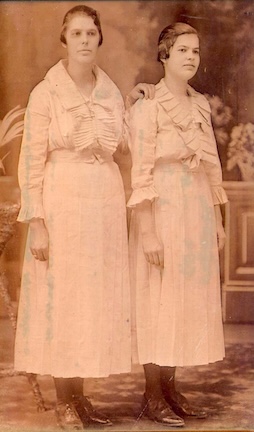As a girl in the Portuguese island of Madeira, my grandmother Angela Ferreira was a companion to the child of a wealthy family. Her older sister was a servant in the household. My grandmother or Avó was the youngest of a large, poor family. I am guessing her parents didn’t mind having one less child to feed at home.
My grandmother’s job was to play with the little girl and carry her books to and from school. While the girl was in class, she sat in the back of the room until it was time to return home.
One day, the teacher caught my grandmother trying to read with the rest of the class. But instead of getting her into trouble, the teacher approached the wealthy parents, who consented to let her attend the school. That was how my grandmother learned to read when so few did then.
When she was 16, Avó left with the same sister, Maria, to live in the U.S., and never saw her family in Madeira again. I heard the story of the large storm their ship encountered in the Atlantic, how people were swept overboard and everyone prayed to get through it. My grandmother and her sister stayed mostly below. The photo on this post shows my grandmother Angela, on the right, and Maria shortly after they arrived in the U.S.
My grandmother settled in New Bedford, Mass., where she worked as a weaver in a textile mill when that industry was booming there. She married a man, Manuel, from her village in Madeira and raised three daughters, and later a grandson.
She and my grandfather moved to a small town where they lived off the land while they continued to work in the mills. They took classes to learn English. It was not a happy marriage, however, due to my grandfather’s problems. I am surmising it was a struggle for him to adjust to life in a new country. There’s more to that story, but this one is about my grandmother.
We called her Vovó out of affection. She was an interesting grandmother, with a goat barn, grape arbor, a field for ballgames, and interesting nooks in her home. We saw her almost every weekend. She baked us chocolate chip cookies, always enough to take home when we were done visiting. However, I can’t say my sisters and I enjoyed her main dishes, which always had an odd flavor. We used to say it had “grandma’s secret spice.”
Avó had a poodle named Sonny Bono, a series of shelter mutts called Lassie, and a bird named Bobby Vinton. She loved TV wrestling, Elvis, and because she could read, the National Enquirer. She saved the copies for me since she knew I loved reading about celebrities.
It’s been many years since Avó left us, but I am still inspired by her quest to read.

